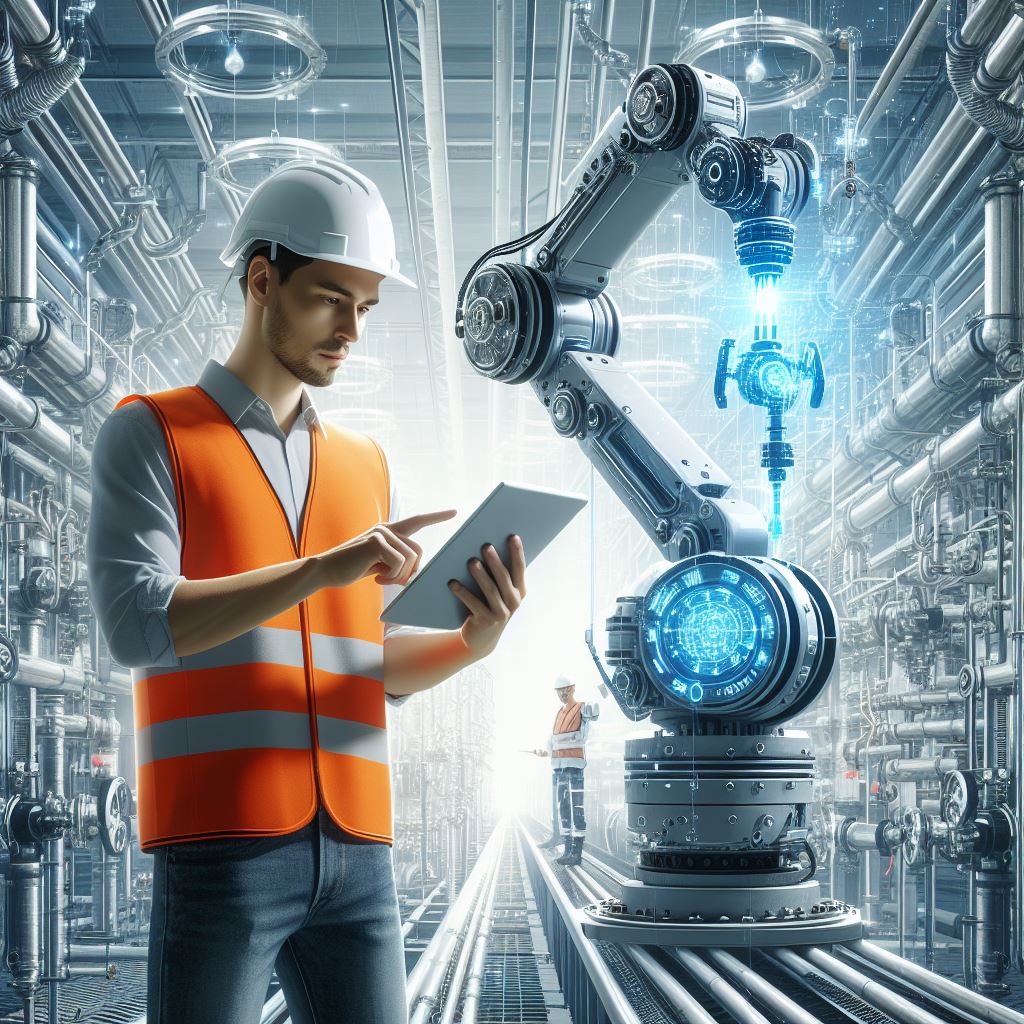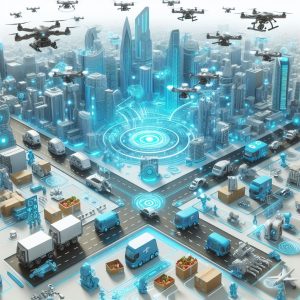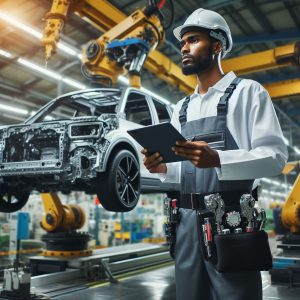Introduction
As Artificial Intelligence (AI) and robotics continue to advance, the role of robot operators is undergoing a transformative change. From manufacturing and healthcare to space exploration, AI is automating tasks and empowering robots to perform complex operations with enhanced precision and efficiency. This blog explores the impact of AI on the role of robot operators, highlighting emerging opportunities and the evolving skill sets required to navigate the AI-driven robotics landscape.
AI’s Impact on Robot Operators
-
Shifting Focus from Direct Control to Supervision:
AI-enabled robots are increasingly capable of autonomous operations, allowing robot operators to shift their focus from direct control to supervisory roles. Operators now monitor and oversee the performance of multiple robots, ensuring optimal functionality and addressing any issues that arise. -
Enhanced Safety and Risk Reduction:
AI algorithms can analyze vast amounts of data in real-time, enabling robots to identify potential risks and hazards in their environment. This heightened awareness minimizes accidents and enhances safety for both humans and robots, reducing downtime and improving overall productivity. -
Precision and Quality Improvement:
AI-powered robots can perform tasks with higher levels of precision and accuracy than human operators. This leads to improved product quality, reduced defects, and increased efficiency, particularly in industries such as manufacturing and healthcare. -
Remote Operation and Accessibility:
AI advancements allow robots to be remotely operated from distant locations. This opens up possibilities for tasks in hazardous environments, such as space exploration or underwater exploration, where human presence is impractical or risky.
Emerging Opportunities for Robot Operators
-
Robotics Technician:
As AI-powered robots become more complex, the demand for skilled robotics technicians who can maintain, repair, and troubleshoot these sophisticated machines will grow. This role requires a deep understanding of robotics systems, AI algorithms, and programming languages. -
AI-Robot Programming Specialist:
Professionals who specialize in programming and training AI-powered robots will be in high demand. These experts develop and optimize AI algorithms to enable robots to perform specific tasks and integrate them seamlessly into existing systems. -
Robot Safety Engineer:
The integration of AI into robotics demands specialized engineers who can assess and mitigate potential risks associated with autonomous robots. They ensure that robots operate safely, adhere to regulatory standards, and minimize the likelihood of accidents. -
Human-Robot Interaction (HRI) Specialist:
The effective collaboration between humans and robots requires professionals skilled in human-robot interaction. These specialists design intuitive user interfaces, communication protocols, and training programs to enhance the seamless interaction between humans and AI-powered robots.
Evolving Skill Sets for Robot Operators
-
Programming and Coding Proficiency:
A solid foundation in programming languages and software development is essential for robot operators to modify and customize AI algorithms to suit specific applications and tasks. -
Data Analysis and Machine Learning Expertise:
Understanding data analysis techniques and machine learning algorithms enables robot operators to interpret data generated by AI-powered robots, identify patterns, and optimize performance. -
System Integration and Networking Knowledge:
Robot operators need to possess knowledge of system integration and networking principles to ensure that robots can communicate effectively with other machines, sensors, and control systems. -
Communication and Collaboration Skills:
Effective communication and collaboration skills are crucial for robot operators to work seamlessly with team members, managers, and stakeholders from diverse backgrounds. -
Adaptability and Continuous Learning:
In the rapidly evolving world of AI and robotics, adaptability and a commitment to continuous learning are vital. Robot operators must stay updated with technological advancements and be open to embracing new skills and knowledge.
AI is profoundly shaping the role of robot operators, creating a dynamic landscape of opportunities and challenges. From enhanced safety and precision to remote operation and risk reduction, AI is revolutionizing the way robots are deployed and utilized across industries. However, this transformation also demands a revised skill set, including programming proficiency, data analysis expertise, and a willingness to adapt and learn continuously. As AI and robotics continue to converge, robot operators who embrace these changes and acquire the necessary skills will be well-positioned to thrive in the AI-driven future of robotics.
Dangers for Robot Operator Job in Auto Industry:
-
Repetitive and Hazardous Tasks: Robot operators perform repetitive and potentially hazardous tasks, such as welding, assembly, and material handling. Prolonged exposure to these activities can lead to musculoskeletal disorders, hearing loss, and respiratory issues.
-
Safety Risks: Working in close proximity to robots can pose safety risks, including the potential for injury or even death in case of malfunctions or accidents. Operators need to be well-trained and vigilant to avoid such incidents.
-
Job Displacement: The increasing adoption of AI-powered robots in the auto industry poses a significant threat to robot operator jobs. As AI robots become more advanced and capable, they may be able to perform many of the tasks currently done by human operators, leading to job losses.
Possibilities of Job Being Replaced by AI:
-
Automation of Simple Tasks: AI-powered robots are already capable of performing many of the simple and repetitive tasks currently done by human robot operators. This includes tasks like welding, assembly, and material handling. As AI continues to advance, robots may be able to take on even more complex tasks, further reducing the need for human operators.
-
Cognitive Tasks: AI robots are also becoming increasingly capable of performing cognitive tasks, such as data analysis, quality control, and decision-making. This may lead to the replacement of human operators in roles that require these skills.
-
Collaboration with AI: AI robots may not completely replace human robot operators but could instead collaborate with them to enhance efficiency and productivity. For example, AI robots could be used to perform dangerous or repetitive tasks, while human operators could focus on more complex and strategic tasks.
How AI Will Be Used to Help in the Job:
-
Enhanced Safety: AI can be used to enhance the safety of robot operators by monitoring robot movements and intervening in case of malfunctions or potential accidents. AI systems can also be used to generate real-time safety alerts and recommendations for operators.
-
Improved Efficiency: AI can be used to optimize robot operations, such as by analyzing data to identify areas for improvement and recommending adjustments to robot programming. This can help to increase productivity and efficiency.
-
Quality Control: AI can be used to perform quality control tasks, such as inspecting products for defects and ensuring that they meet specifications. This can help to improve product quality and reduce the risk of errors.
-
Predictive Maintenance: AI can be used to predict when robot maintenance is needed, based on data such as robot usage and performance. This can help to prevent unexpected breakdowns and keep robots operating at peak efficiency.
How to Adapt to the Changing Landscape:
-
Upskill and Reskill: Robot operators need to upskill and reskill to adapt to the changing landscape. This may involve learning new skills related to AI, robotics, and data analysis.
-
Embrace New Technologies: Robot operators should embrace new technologies that can enhance their productivity and safety. This may include AI-powered tools and software that can automate tasks, provide real-time insights, and improve decision-making.
-
Become a Collaborator: Robot operators should see AI robots not as replacements but as collaborators. By working together with AI robots, operators can achieve greater efficiency, productivity, and safety.
-
Explore New Opportunities: Robot operators should be open to exploring new opportunities in the auto industry or other sectors. This may involve moving into roles that require skills in AI, robotics, or other emerging technologies.



